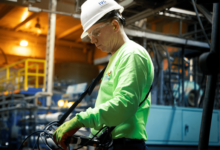Mastering High-Risk Operations: Elevating Skill Sets for Complex Tasks

High-risk industrial operations demand more than basic competency from your workforce. Complex machinery, hazardous environments, and precision-critical tasks require specialised knowledge that goes beyond standard training approaches. The difference between adequate preparation and expert-level proficiency can determine whether your operations run smoothly or face costly disruptions, safety incidents, and regulatory complications.
Specialised training programmes like those offered by Insite Training recognise the unique challenges facing UK industrial operations today. Targeted instruction builds the precise abilities needed for complex tasks, reducing operational risks that could otherwise threaten productivity and safety standards. Properly certified professionals understand not just the technical requirements but the nuanced decision-making processes that separate competent operators from those who merely follow procedures without a genuine understanding of the underlying principles.
The Critical Nature of High-Risk Industrial Operations
Understanding Operational Complexity: Modern industrial environments present multifaceted challenges that require sophisticated skill sets. Heavy machinery operations, confined space work, and height-based activities each carry distinct risk Mastering High-Risk Operations: Elevating Skill Sets for Complex Tasksprofiles that demand specialised approaches. Your workforce needs to navigate these complexities with confidence, understanding both the immediate technical requirements and the broader safety implications of their actions.
Risk Assessment Capabilities: Effective high-risk operations depend on workers who can assess situations dynamically. Training programmes must develop analytical thinking alongside technical competencies. Operators need to recognise when conditions change, understand how environmental factors affect their work, and make informed decisions under pressure. This level of expertise doesn’t develop through basic instruction alone.
Regulatory Compliance Requirements: UK industrial operations face stringent regulatory oversight from multiple agencies. The Health and Safety Executive, DVSA, and sector-specific regulatory bodies impose detailed requirements that affect every aspect of high-risk work. Your teams need comprehensive understanding of these regulations, not just surface-level compliance knowledge that might fail under scrutiny.
Building Precision Through Targeted Instruction
Technical Skill Development: Specialised instruction focuses on developing muscle memory and technical precision that standard training often overlooks. Complex operations require workers who can perform tasks accurately under various conditions. Proper training programmes break down complex procedures into manageable components, building competency systematically rather than hoping workers will develop expertise through trial and error.
Safety Protocol Integration: Perhaps the most critical aspect of high-risk operations training involves integrating safety protocols into every action. Workers need to understand why specific procedures exist, not just how to follow them. This deeper understanding helps prevent the dangerous shortcuts that inexperienced workers sometimes take when they don’t grasp the reasoning behind safety requirements.
Equipment Familiarity: Different manufacturers, models, and configurations require specific knowledge that general training cannot provide. Targeted instruction ensures workers understand the particular equipment they’ll encounter in your operations. This familiarity reduces setup time, prevents costly errors, and builds the confidence needed for efficient operation.
Heavy Machinery Operations Excellence
Precision Control Techniques: Operating heavy machinery effectively requires understanding the subtle relationships between controls, load dynamics, and environmental conditions. Skilled operators develop an intuitive sense for equipment behaviour that allows them to work efficiently while maintaining safety margins. This expertise comes from structured learning combined with practical application under expert supervision.
Load Management Principles: Many costly accidents result from poor load management decisions. Operators need to understand weight distribution, centre of gravity principles, and how different materials behave under various conditions. Training programmes that address these fundamental concepts produce operators who can handle unexpected situations without compromising safety or productivity.
Maintenance Awareness: Effective machinery operators understand basic maintenance principles and can identify potential problems before they become serious issues. This awareness reduces downtime, prevents costly repairs, and extends equipment life. Training that includes maintenance fundamentals produces operators who contribute to overall operational efficiency rather than simply performing assigned tasks.
Working at Heights Safely and Efficiently
Fall Protection Systems: Height-based work requires comprehensive understanding of fall protection equipment and systems. Workers need to know how to select appropriate equipment, inspect it properly, and use it correctly in various situations. Poor fall protection practices represent one of the most serious risks in industrial operations, making this training area particularly critical.
Access Planning: Effective height work begins with proper planning and site assessment. Workers need to evaluate access routes, identify potential hazards, and select appropriate equipment before beginning work. This planning phase often determines whether the work proceeds safely and efficiently or encounters problems that could have been prevented.
Emergency Procedures: Height-based operations require specific emergency response procedures that differ from ground-level protocols. Workers need to understand rescue techniques, communication procedures, and evacuation methods that apply to elevated work environments. This knowledge provides confidence that encourages proper safety practices rather than dangerous shortcuts.
Confined Space Operations Mastery
Atmospheric Monitoring: Confined space work requires continuous awareness of atmospheric conditions that can change rapidly. Workers need to understand how to use monitoring equipment properly, interpret readings correctly, and respond appropriately to changing conditions. This technical knowledge forms the foundation for safe confined space operations.
Entry and Exit Procedures: Proper confined space entry involves systematic procedures that ensure worker safety throughout the operation. Training must cover pre-entry planning, ongoing monitoring, and emergency egress procedures. These protocols protect workers and provide the structured approach needed for efficient completion of confined space tasks.
Communication Protocols: Confined space operations depend on clear communication between workers inside the space and support personnel outside. Effective training establishes communication procedures that maintain safety while supporting productive work. These protocols become particularly important during emergency situations when clear communication can prevent serious incidents.
Key Training Components for Complex Operations
Effective training programmes for high-risk operations must address multiple competency areas simultaneously:
- Technical proficiency development through hands-on practice with real equipment and realistic scenarios
- Risk assessment skills that enable workers to evaluate changing conditions and make appropriate decisions
- Regulatory compliance knowledge covering relevant UK standards and industry-specific requirements
- Emergency response procedures tailored to specific operational environments and potential hazards
- Quality control understanding that helps workers maintain standards while working efficiently
Industry-Specific Certification Requirements
Manufacturing Sector Demands: UK manufacturing operations face unique challenges that require specialised training approaches. Complex production environments, quality requirements, and efficiency pressures create training needs that generic programmes cannot address effectively. Your workers need industry-specific expertise that translates directly to improved operational performance.
Construction Industry Standards: Construction operations involve diverse high-risk activities that change frequently based on project requirements. Workers need adaptable skills that allow them to handle various scenarios safely and efficiently. Training programmes must balance broad competency development with specific skill building for particular construction applications.
Logistics and Warehousing Operations: Modern logistics operations combine traditional warehousing activities with sophisticated technology systems. Workers need technical skills for equipment operation alongside understanding of inventory management, quality control, and safety protocols. This combination requires training programmes that address both technical and operational competencies.
Developing Long-Term Competency
Continuous Learning Approaches: High-risk operations evolve continuously as technology advances and regulations change. Effective training programmes establish foundations for ongoing learning rather than providing static skill sets. Workers need to understand how to adapt their knowledge as conditions change and new requirements emerge.
Performance Monitoring Systems: Successful competency development requires ongoing assessment and feedback. Training programmes should include methods for tracking skill development, identifying areas needing improvement, and providing targeted additional instruction. This systematic approach ensures that competency continues developing after initial certification.
Career Progression Pathways: Effective training programmes create clear pathways for skill advancement that motivate workers and support operational needs. Structured progression helps retain skilled workers while building the advanced capabilities needed for complex operations. This approach benefits both individual workers and organisational capability development.
Measuring Training Effectiveness
Competency Assessment Methods: Proper evaluation of high-risk operations training requires assessment methods that reflect real-world conditions. Paper-based testing alone cannot demonstrate the practical skills needed for complex operations. Effective programmes combine written assessments with practical demonstrations that prove competency under realistic conditions.
Performance Metrics: Training effectiveness should be measured through operational performance improvements, not just completion rates. Reduced incident rates, improved productivity, and better regulatory compliance indicate successful training outcomes. These metrics provide objective evidence of training value that supports continued investment in worker development.
Return on Investment Analysis: High-quality training programmes require significant investment, but they deliver measurable returns through improved efficiency, reduced incidents, and better regulatory compliance. Understanding these returns helps justify training investments and supports decisions about programme expansion or modification.
Conclusion
Mastering high-risk operations requires more than basic training approaches can provide. Your workforce needs specialised expertise that addresses the complex technical, safety, and regulatory requirements of challenging industrial environments. Proper certification programmes build the precise abilities needed for safe, efficient operations while reducing the operational risks that threaten productivity and profitability. Take the next step in elevating your team’s capabilities by exploring comprehensive training solutions that address your specific operational challenges.





